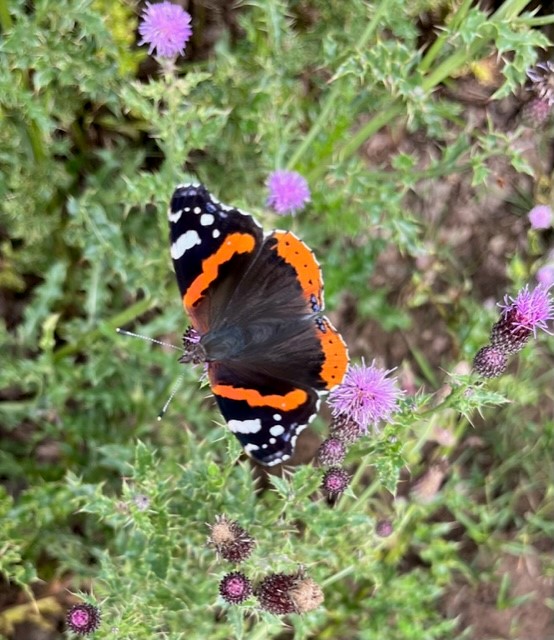The Apiary in July
Title image by CAD: Beautiful Red Admiral Butterfly on Buddleia (aka the Butterfly Bush)
As expected most of July has been cold and very wet for this time of year preventing our colonies from getting out to collect any sort of summer crop and causing the Queens to stop laying or slow right down.
This is clearly going to cause issues as we head into Autumn (sorry folks) with a lot of older worker bees in the hive and few youngsters supplementing the work force, ready for any sort of late flow if the weather improves.
We have all noticed how the temper of our colonies has changed for the worse as they become more aggressive as a reaction to the lack of a nectar flow and intrusion from WASPS and Robber bees.
By this time of year we no longer need to carry out our regular brood box inspections as the swarming season is just about over, but I was called out to a very small cast at the end of the month.
WASPS WASPS WASPS are going to be a real nuisance this year as I’ve seen many nosing around hive entrances trying to find a way in to steal honey or whatever they can lay their mandibles upon.
Best advice we can give is to close the front entrance right down, put in your wooden mouse guards, so the colony has less to defend at their front door.
If you find wasps starting to get into your weaker hives or Nucs, close the hive down by blocking the entrance for a few days in this cold and wet temperature it will do no harm or move the weak colony to another site with a much reduced entry point and no WASPS.
If you are able to find nests near to your Apiary best to kill them off but if you are putting up WASP traps don’t put them up near your hives but a good 2 or 3 meters away or you will just attract more into your hives.
I normally use a plastic bottle with a narrow top or a milk bottle with few holes drilled or burnt into the plastic sides, filled with a substance to attract WASPS but not bees – smelly fish or old jam turned sour works really well when floating in a few inches of water.
But you may need to refill them on a regular basis at least once a week.
I’ve got nothing against WASPS they are the real undertakers of the insect world, but when they start molesting my colonies it becomes open season for a while anyway.
ASIAN HORNET
This invasive species is clearly trying to set up home along the South Coast as it has in the Channel Islands, battled by the local Beekeepers who are killing increasing numbers each Spring, Summer and now Autumn.
I’m not going to repeat all the good advice on dealing with Asian Hornets and spotting them “Hawking” outside your colonies but please find the time to complete the Asian Hornet Online Assessment that the BBKA has put together.
The Association is informed when you complete this Assessment which will enable us to try and manage the encroachment, if and when it reaches our region as we did with the Varroa all those years ago.
VARROA
Once you have taken off your summer honey crop, if you were lucky to have any left if the bees have not consumed it all to survive the July dearth of nectar, you need to consider what if any Varroa treatment you need to use.
As we all know the Varroa lay their eggs in the brood cell just before it is sealed which makes it more difficult to treat the hatching little beasts in sealed brood cells.
That’s why the better treatment hits the adult Varroa who ride around on the back of the adult bee, be it the Queen Worker or Drones whilst their is little brood in the hive.
I would recommend you check your Varroa floor slides to see what the “drop” is like and make your decisions on the need to treat and what manufactured product you use, whilst we have little brood in the hives and you have removed the honey supers.
FEEDING
As we have stocked up on Fondant from Wests Bakery in Wellesbourne ready for the the Autumn feeding of our colonies, you may wish to consider giving them a couple of Kilograms a little earlier than anticipated as some of them are very short of stores.
After removing any honey, “heft” that hive to see what weight is left in the brood chamber. Some of mine were very light.
The Nucs and other smaller colonies I’ve had to feed through most of the month, as they would have starved, ensuring the young Queens keep on laying.
If anybody has not ordered their Fondant yet, John is probably going to order a second delivery from Wests Bakery, but remember you pay the Association account first.
Next Month: Preparing for Autumn
Thistles are weeds but our insects love them when little else is around to forage from.



